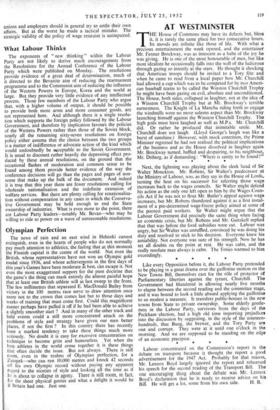What Labour Thinks
The exponents of " new thinking " within the Labour Party are not likely to derive much encouragement from the Resolutions for the Annual Conference of the Labour Party which were published on Monday. The resolutions provide evidence of a great deal of determination, much of it directed to the Bevanite aim of reducing the rearmament programme and to the Communist aim of reducing the influence of the Western. Powers in Europe, Korea and the world at large. But they provide very little evidence of any intellectual process. Those few members of the Labour Party who argue that, with a higher volume of output, it should be possible to provide both more arms and more consumer goods, are not represented here. And although there is a single resolu- tion which supports the foreign policy followed by the Labour Government, and therefore by implication favours the policies of the Western Powers rather than those of the Soviet block, nearly all the remaining sixty-seven resolutions on foreign policy either assume that the choice between the two groups is a matter of indifference or advocate action of the kind which would undoubtedly be acceptable to the Soviet Government. It is usual to discount rather heavily the depressing effect pro- duced by these annual resolutions, on the ground that the occasional flashes of moderation and common sense to be found among them provide better evidence of 'the way the conference decisions will go than the pages and pages of non- sense that make up the bulk of the document. And indeed it is true that this year there are fewer resolutions calling for _wholesale nationalisation and the indefinite extension of welfare services. But there are plenty calling for renationalisa- tion without compensation in any cases in which the Conserva- tive Government may be bold enough to end the State ownership of industries. What is even more to the point, there are Labour Party leaders—notably Mr. Bevan—who may be willing to ride to power on a wave of unreasonable resolutions.


































 Previous page
Previous page